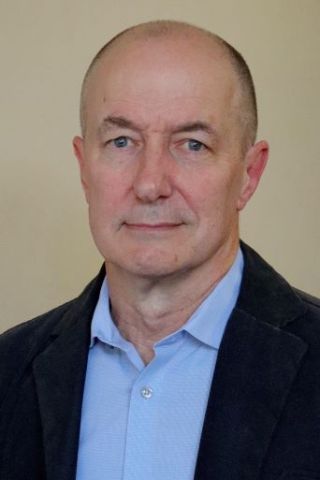Psychiatry
From Conversion to FND: An Interview With Anton Scamvougeras
On the cause of functional neurological disorders.
Updated May 29, 2024 Reviewed by Monica Vilhauer

Anton Scamvougeras, MBChB, FRCPC, is a neuropsychiatrist in the UBC Neuropsychiatry Unit at the University of British Columbia in Vancouver, British Columbia. He directs the Adult UBC Tourette's Clinic and since the mid-1990s has had a special interest in helping individuals with severe functional disorders.
Mark Ruffalo: I recently had a chance to read your paper with Dr. David Castle titled, "Functional Neurological Disorders: Challenging the Mainstream Agnostic Causative Position," published in the Canadian Journal of Psychiatry. I found it to be an excellent critique of much of the modern thinking on conversion disorder, which we now call functional neurological disorder (FND). First, for our readers, can you briefly describe FND?
Anton Scamvougeras: Many thanks, Mark, for your kind words about our paper, and for the invitation to discuss this engaging topic.
We believe that FND/conversion is best understood as a syndrome where different forms of psychological or psychiatric distress unconsciously and involuntarily emerge as physical symptoms and signs, and where careful assessment shows no general medical causes for the physical manifestations.
Many—perhaps most—clinicians around the globe essentially agree with this understanding. For instance, a recent survey suggests that the majority of Italian psychiatrists consider this condition to have psychological cause (Marotta, 2023). However, some influential voices oppose this approach.
MR: Can you tell us what you mean when you refer to the agnostic causative position on FND?
AS: The DSM-5 classification system, along with the current most prominent voices in the field, now use definitions of FND/conversion that actively avoid any reference to psychological underpinnings, and are emphatically non-committal in this regard. We have thus dubbed this position "agnostic."
Instead, these conditions are described as being the result of nebulous "brain network dysfunction" and the very commonly associated psychological distress is framed as "co-morbid" or "one of many risk factors."
We are saying there is enough evidence to say with a reasonable degree of confidence that we do know that these conditions are caused by psychological factors; the "agnostics" are saying we do not know.
We believe that this fundamental move away from the psychological has been brought about without evidence, and largely out of political expedience—the desire to avoid stigma—rather than for reasons valid to the condition.
The distinction between the psychological and agnostic models may not seem important to casual observers, but it makes a great deal of difference when it comes to clinical approach, and research direction.
MR: What do you believe has been the effect of the change in nomenclature from conversion disorder (used for more than a century) to functional neurological disorder in DSM and in most scientific publications on the problem?
AS: This change is one of many steps being taken to distance these conditions from the idea of them being psychological or psychiatric at core, and is an important part of the move to "agnosticism."
"Conversion" refers to the emergence of psychological distress as physical symptoms, and thus using it emphasizes a "psychological-engine" understanding. For this reason it is being shunted aside.
"Functional neurological" may seem neutral, but it does contain subtle semantic optimism which is part of the entire move. "Functional" happens to have the connotation of meaning "working properly" for many lay people. "Neurological" emphasizes—arguably over-emphasizes—the physical manifestations of this condition, making it, for those who don't understand neuropsychiatry, sound superficially more "real" than disorders labelled "psychiatric."
When it comes to nomenclature, I personally believe that the best term for these conditions remains "somatoform." It refers to being "in the form of the body" but at the same time elegantly implies that something else is going on. I think that wielded correctly, in a sensible and improved classification system, "somatoform" would have served everybody very well. But it seems that boat has sailed, and we are stuck with "FND" for the foreseeable future.
MR: Much of this confusion seems, to me, to rest on the faulty assumption that if a problem can be described at the biological level, this, ipso facto, renders psychological descriptions or conceptualizations inaccurate or obsolete. We encounter this type of thinking on issues across the psychiatric diagnostic spectrum. Do you think there is anything unique to FND in this regard?
AS: FND seems to be more prone to this kind of confusion because the physical manifestations lend themselves to neurobiological interpretations more readily than the symptoms of other psychiatric conditions—but the nature of the confusion is the same.
All human emotions, behaviors, and thoughts are the result of "brain-network" fluctuations. Neurobiological formulations do not negate psychological understandings—psychological mechanisms are as neurobiological as anything else, and, if one chooses to continue with this line of thinking, it has even been argued that psychological therapies may end up being the most elegant and effective ways of addressing some specific neurobiological dysregulations.
Recent FND review papers may lead casual observers to believe that we are close to a comprehensive understanding of FND at a neurobiological level, but, as Dr. David Castle and I discuss in our paper, that is far from the truth. The claim that FND is the result of "brain network dysfunction" can only be made on a very general level, and consequently doesn't say very much at all.
The neurobiological is important, but over-emphasis of the neurobiological distracts us from concentrating clinically on the type of neuropsychiatric distress we are dealing with in FND—which we would all agree to best be described as "psychological" or "psychiatric." As a Dutch FND expert recently opined: "You can try to take 'psych' out of the name, but the treatment will always involve someone with 'psych' in their job title."
MR: In your paper with Dr. Castle, you refer to the "pseudo-destigmatization" of FND. As you write, destigmatization requires us to face the nature of the problem squarely and accept it. What, instead, has happened with FND?
AS: The mainstream agnostic position has attempted to destigmatize FND by "de-psychiatrizing" it—by trying to define it as something other than a psychological or psychiatric condition. This is an attempted sleight of hand that we believe is doomed to fail.
The only way truly to destigmatize a condition is to accept it for what it is. For FND, as we say in the paper, this includes "emphasizing that these conditions are as 'real; as any other medical condition, that they are produced by non-conscious and involuntary mechanisms, that they can strike anyone in our society, that they do not represent malingering, and that they can be highly distressing and disabling."
The true nature of any condition will always come out, eventually. We are already hearing of the term "functional" becoming stigmatized in some European countries. Side-stepping only works for so long. I recently heard an agnostic FND researcher say "I suppose we could study individuals with FND who are not anxious or depressed... but they are hard to find." Exactly. Emotional distress is at the core of these disorders. Let's face that, and its implications, and help everybody else face that, too.
Interview continued in Part 2.




